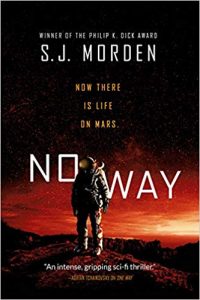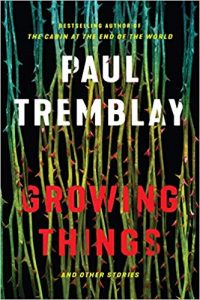Paul Di Filippo reviews Rudy Rucker
A bit over five years ago, Rudy Rucker nearly died. As he recounts in his charming, funny and perceptive autobiography, Nested Scrolls (whose creation was spurred by his brush with mortality), he suffered a brain aneurysm that sent him unconscious to the hospital but which luckily left no permanent physiological fallout.
Since that time, Rucker’s been on a creative tear, as if to thumb his nose at the Reaper. He’s assembled all his stories and essays into fat compendia, and produced many new works as well, at various lengths. Moreover, he’s taught himself self-publishing to meet the demands of a shifting marketplace. His last novel from a semi-big house was Jim and the Flims, from Night Shade. Their messy demise was part of the reason he leaped to DIY. Turing & Burroughs came out in 2012 from his own Transreal Books, and now we get The Big Aha. (As well as a fascinating volume just as large and consisting of associated groundwork and musings, Notes for The Big Aha.)
It should be affirmed right up front that there is simply no hypothetical diminishment of quality that would have made these books unpalatable to any big house and sent them begging down the POD route. They gloriously and objectively exist on an absolute level with all of Rucker’s classic work, chockfull of crazy yet scientifically rigorous ideas embodied in gonzo characters and plots. No, the man has simply gotten tired of acquisition delays, unreasonable contracts, and diminished editorial support. When Mr. Death comes knocking, you realize you’ve got no time to waste. (You can read Rucker’s reasoning on this topic and much more of course in Notes.)
The Big Aha—the title riffs on a state of deliberately triggered cosmic consciousness—picks up many of the themes Rucker has been exploring of late, in such books as Postsingular, Hylozoic and Frek and the Elixir. Biotech; engineered telepathy, other-dimensional beings; and the nature of consciousness. Like a jazzman, Rucker takes his intellectual obsessions as chords and juggles them into fascinating new patterns each time out.
Chapter 1 plops us smack dab in the middle of a surreal bio-future, with living intelligent houses and roadspider cars. One big feature of this milieu is a kind of commercially available a-life known as “nurbs,” which can be configured at will, transitioning from amorphous slime to utensils or living food (recall Al Capp’s Schmoos) or sex toys. Our hero and narrator, Zad Plant, of Lousiville, Kentucky, is an artist working with nurb paints. Unfortunately, he’s on the downslide now, unproductive and separated from his wife Jane.
But then an intriguing new enterprise is presented to him by his buddy Carlo: a chance to market nurb pets in the form of intelligent rats. These rats are the creation of Gaven Graber, a Steve Jobs-type rich guy experimenting with some new tech known as “quantum wetware” or “qwet.” (Let me say at this juncture that, as always, Rucker’s neologisms are perfect and funky and kickass coinages, essential and conducive to the groove of his tale-telling.) Slightly intrigued, Zad agrees to meet Graber.
Chapter 2 is an intriguing packet of backstory, which fleshes out Zad and his posse of eccentrics. Rucker loves lowlifes and slackers, contrarians and mad geniuses, the whole Phildickian assortment of hapless Joes and Jills, and in this book he’s created a very resonant and organically interlocking social scene for them. In Chapter 3 we get a great set piece of all the locals at a party at Graber’s. There, Zad picks up a gal named Loulou Sass, has sex with her, and finds himself infected with qwet. All his cells are irreversibly reconfigured.
Now, most other SF writers would have simply chronicled the exfoliating qwet technology, and probably overlooked half its potential. But Rucker not only dives into every possible niche aspect of having “qwet teep” and mental control over programmable matter—can you say flying jellyfish gliders?—but he also mashes up an alien invasion from another dimension via Einstein-Rosen wormholes to Fairyland. The singular bad guy on the other end is known as a myoor, and has a habit of sucking terrestrials into the wormholes. Oh, but wait, there’s also the Gubs, and gnomes, and hillbilly fairies— How Zad and his cohorts deal with this threat, while at the same time spreading the cosmic vibe and abilities of qwet, forms a rollercoaster ride that is never predictable and always entertaining. At the same time, Rucker plays out Zad’s quest to get back his wife, and a soap opera’s worth of other psycho-sexual hookups among the cast.
Rucker reveals in the “Afterword” attached to the novel—and at greater length in the Notes—that part of his motivation in writing this book was to see if he could recreate the ambiance of the Late Sixties/Early Seventies Hippie Psychedelic Love Scene. He does this in spades, giving us a kind of stoned, what-me-worry atmosphere: Thorne Smith by way of Rudy Wurlitzer. The qwet commune setup at the house of Jane’s parents is straight out of some Kerouac or Kesey novel, yet with a twenty-first century affect. For one of us old Geezer Boomer Dudes, Rucker is remarkably attuned to a new generation.
Here’s his take on why no one goes to college anymore.
“But by now we all had squidskin wristphones—and we made a lot of our social connections through the web. As for learning things, colleges still had some intense courses. But the courses were online as well—if you had the patience to channel them, not that many of us did. In reality, you could get by with grabbing piecemeal off the web—or getting little apps to do the work for you. And whatever you forgot, you could find again.”
This attitude eerily replicates recent journalistic reports I’ve seen from the frontlines of high schools, and is the kind of secondary-effect fallout from technology that is so often overlooked in SF novels.
Ultimately, all the craziness and whimsy and otherworldly menaces of Zad’s mad odyssey induces true pathos and catharsis in the reader. Not to give away any revelations, but Zad’s new mature wisdom at the book’s close about the nature of the Big Aha—”All you have to do is pay attention”—will appear exactly as profound to each reader as his or her own empathy with Rucker’s zen craziness allows.








I greatly enjoyed reading this well-done review, and I’m going to seek out Mr. Rucker’s latest POD work. Thanks, Paul, for raising a Ruckerus.